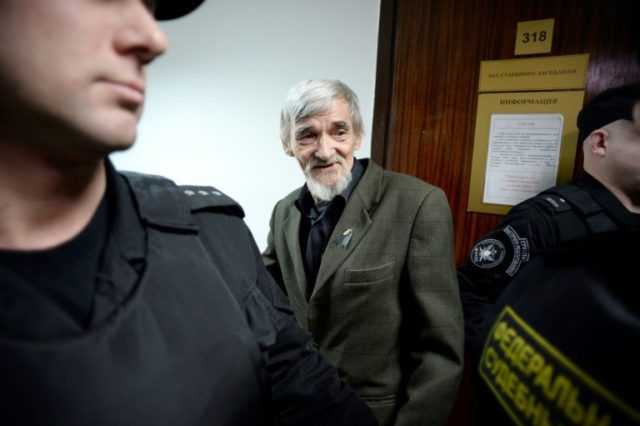Petrozavodsk (Russia) (AFP) – A Russian gulag historian who has exhumed Stalin-era mass graves was on Thursday found not guilty of child pornography charges and released following a trial that supporters have denounced as a sham.
“I am free,” shouted historian Yury Dmitriyev after he was released in the courtroom in the city of Petrozavodsk in northwestern Russia following an outcry from rights activists and liberals.
But Dmitriyev, who had spent more than a year in pre-trial detention, was found guilty of firearm possession charges and released on conditions that will limit his freedom.
The 62-year-old, who is the head of rights group Memorial’s branch in Karelia in northwestern Russia, called the ruling “just”.
“Because nothing bad had happened,” he said after the closed-door hearing.
Activists have said the case against Dmitriyev was an attempt by authorities to muzzle the outspoken historian who has called attention to one of the darkest chapters in Russia’s history.
Dmitriyev spent decades locating and exhuming mass graves of Russians and foreigners killed in summary executions during Soviet dictator Joseph Stalin’s rule.
Prosecutors had requested nine years in a “harsh regime” colony for the outspoken activist whose case outraged Russia’s human rights activists and liberals.
The case centres on naked photographs of Dmitriyev’s then pre-teen adopted daughter Natalya seized during a search of his home after an anonymous tip-off to police.
Dmitriyev’s defence said the photographs were taken to track the girl’s improvement as she recovered from malnutrition.
Some observers had expected the verdict and possible sentence to serve as a barometer for the country’s direction under the fourth Kremlin term of President Vladimir Putin, who extended his rule until 2024 in an election last month.
Many had not expected an acquittal.
– ‘Normal parental care’ –
In a statement released earlier Thursday, top rights activists including Lyudmila Alexeyeva, head of the Moscow Helsinki Group, had urged the court to deliver a “lawful and just” ruling while pointing to multiple procedural violations.
“Dmitriyev’s actions did not exceed the scope of normal parental care over his child’s development and health,” the statement said.
Dmitriyev was arrested in late 2016 and spent more than a year in pre-trial detention before being released in January after calls from prominent figures for him to be freed.
Alexander Cherkasov, a senior director at Memorial, said the historian was an inconvenient person for Moscow given his work and stance against the authorities, and that the case had been fabricated.
“His activities do not make the ideological and administrative bosses happy,” he told AFP.
Experts who last examined the pictures of Dmitriyev’s adopted daughter concluded that they were not pornographic but the prosecution disagreed, his defence team said.
“Essentially, this means that prison awaits anyone who has naked pictures of children or grandchildren in their home photo album,” said top independent newspaper Novaya Gazeta.
– ‘Dear dad, I miss you’ –
Instead of making a speech in his defence last week, Dmitriyev read out in court a letter Natalya sent to him while he was in pre-trial detention last year.
“Dear dad, I miss you very much. I am hoping that you will be released soon,” said the handwritten letter, a copy of which was published by Novaya Gazeta.
“Love you with all my heart,” said the letter decorated with red hearts.
The girl now lives with her grandmother, who originally sent the child to an orphanage before the historian adopted her.
Dmitriyev helped open the Sandarmokh memorial in a pine forest in Karelia in memory of thousands of victims — including many foreigners — executed in 1937 and 1938.
He was released from pre-trial detention in January after prominent figures including Natalia Solzhenitsyna, the widow of the Nobel Prize-winning author Alexander Solzhenitsyn, and acclaimed film director Andrei Zvyagintsev urged he be freed.
Rights groups have accused Putin of seeking to whitewash Stalin’s crimes amid patriotic fervour whipped up by state propaganda.
Historians estimate about one million people perished in Stalin’s Great Purge in the 1930s, out of around 20 million who died under his three-decade rule before his death in 1953.

COMMENTS
Please let us know if you're having issues with commenting.